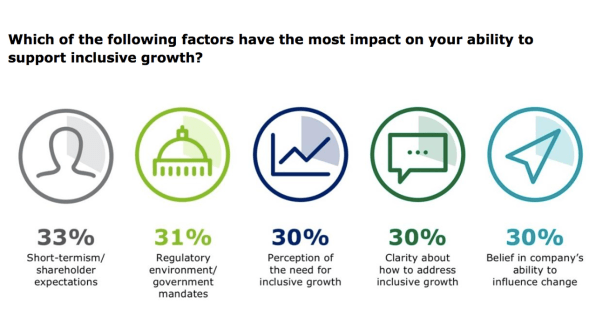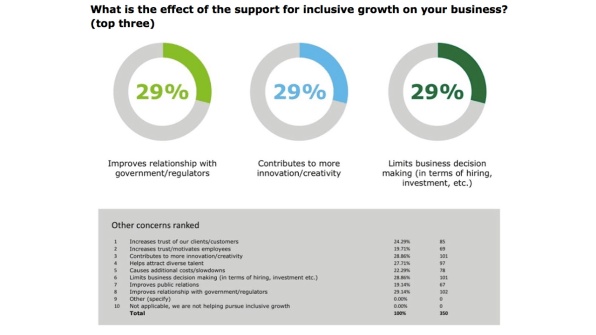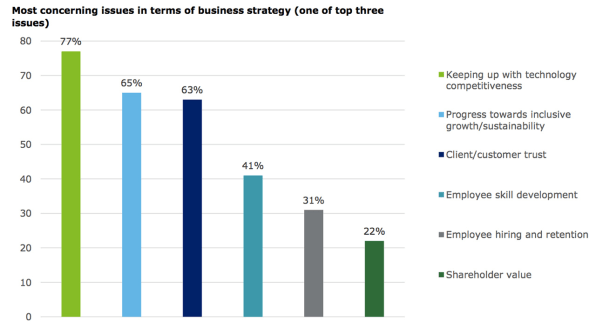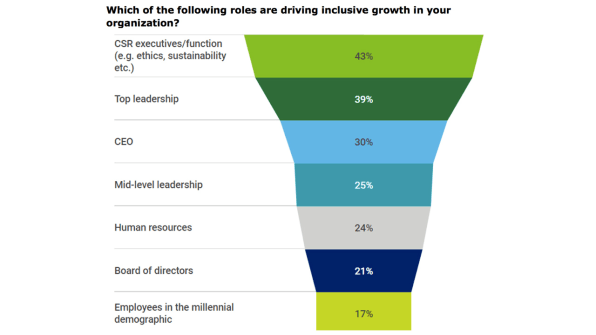The head of the world’s largest investment fund, Blackrock, set Wall Street aflutter recently when he told CEOs they needed to act more in society’s interests. No more short-termism to fulfill quarterly earnings targets. It’s time for more decision-making in the name of sustainability and a harmonious world, said Larry Fink.
“To prosper over time, every company must not only deliver financial performance, but also show how it makes a positive contribution to society,” Fink said in a much cited letter to CEOs. “Companies must benefit all of their stakeholders, including shareholders, employees, customers, and the communities in which they operate.”

In truth, many CEOs probably already understand the social imperative. They’ve been hearing similar messages about corporate social responsibility for a decade and more. The harder question, as a new survey shows, may be how they carry out that mandate. Squaring the need to serve multiple stakeholders with the need to serve profit-hungry investors remains a big challenge.
The survey, based on responses from 350 executives from multiple countries, comes from the global consulting firm Deloitte. It finds that CEOs are keen to enact an agenda around the Sustainable Development Goals, the suite of global commitments covering everything from ending extreme poverty and hunger to tackling climate change and reducing income inequality. Fully 92% of respondents say they support the SDG agenda. But just 17% believe they currently have programs in place to help achieve the SDGs by 2030.

Fink asked CEOs to take up the slack from governments that he said are failing “to prepare for the future, on issues ranging from retirement and infrastructure to automation and worker retraining.” Society is increasingly turning to the “private sector and asking that companies respond to broader societal challenges,” he said. But CEOs have yet to work out how to go about reaching those goals. For example, only 12% of executives believe their businesses will collaborate with governments to ensure schools are preparing students “appropriately for the future.”
“I think people find it hard to know how they can contribute over and above what they’re doing at the moment. There is a [complicated] landscape [of opportunities] out there, but in some cases companies are still coming to grips with what they should be doing,” says David Cruickshank, Deloitte’s global chairman, in an interview with Fast Company.

“They say quite explicitly that their businesses only prosper if the societies that they serve prosper. But a lot of businesses struggle to focus what they do and they don’t have great measures of impact. There is a lack of standardization in non-financial reporting.”
Two-thirds of respondents cite “progress toward inclusive growth/sustainability” as a top concern, above issues like customer trust and employee retention. About a third of executives said social initiatives can improve relationships with governments and regulators and improve internal creativity and innovation. More surprisingly, just 17% said attracting and retaining millennial staff was a big driver for social programs; other surveys have often found that to be a consideration for companies adopting CSR.

Fink’s letter was “likely to cause a firestorm in the corner offices of companies everywhere” according to the New York Times’s Andrew Ross Sorkin. And it seems timed to encourage executives to think how they’re going to use savings generated from the recent corporate tax cut. Instead of sending the money back to shareholders in the form of dividends or share buybacks (which raise stock prices), Fink seems to be saying they should invest in social projects instead.
However, if Deloitte’s survey is any guide, companies haven’t yet worked out how to follow Fink’s advice and measure the social and environmental impact that results. “Whenever I get together with executives, this is high up the agenda. There is a change of attitude from pension funds and other funds to have more purpose and invest in sustainability. But they may still wonder if they are doing enough of the right things, or if things they are doing are focused enough,” Cruickshank says.
Fast Company , Read Full Story
(32)